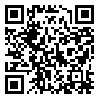Volume 10, Issue 1 (Spring 2015)
jmed 2015, 10(1): 72-83 |
Back to browse issues page
Faculty of Letters and Humanities, Shahid Chamran University, Ahvaz- Iran , saeed.khazaie@gmail.com
Abstract: (14269 Views)
Abstract
Introduction: Parallel with the rapid advancements in information and communication technology (ICT) and evolving learner behaviors, language teaching and learning discipline looks to from the application of these developments for learning and teaching English as a lingua franca (ELF). However, acquisition of ELF is deemed to be a demanding experience affecting learners both psychologically and socially, among others. With the goal of developing novel practice episodes in L2 English writing classrooms, the present study adapted an m-game-mediated blended module of L2 learning.
Methods: Eighty four female and male medical students from Ahvaz Jundishapur University of Medical Sciences were purposefully selected to learn L2 writing through the blended module in 42 dyads during the second semester of 2014-2015 academic year. To adopt a triangulation research design, data were collected using three major instruments, namely attitude questionnaire, formative assessment and interview.
Results: In the first and third practice episodes, entertainment for the most part, took precedence over the intended instructional content and subject matter. But, when the materials were fed into the native gaming scene participants did pay more attention to the intended content. In effect, the amount of learners' familiarity with the practicing contexts shaped their conceptual schemata and also flourished their creativity.
Conclusion: In the nutshell, moderating unfamiliarity of the practicing context bails learners out from becoming overwhelmed by cognitive overload. However, unwarranted moderation in learning setting, in turn, nips the conditions that stifle learners' creativity in the bud thus resulting in their underperformance.
Type of Study: Research |
Subject:
English
Received: 2015/04/2 | Accepted: 2015/04/4 | Published: 2015/06/15
Received: 2015/04/2 | Accepted: 2015/04/4 | Published: 2015/06/15
| Rights and permissions | |
 |
This work is licensed under a Creative Commons Attribution-NonCommercial 4.0 International License. |


